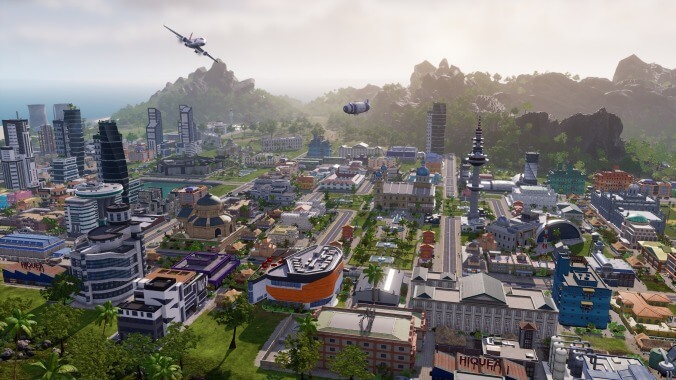Do we still have an appetite for Tropico 6’s brand of dictator-flavored fun?

Every Friday, several A.V. Club staffers kick off our weekly open thread for the discussion of gaming plans and recent gaming glories, but of course, the real action is down in the comments, where we invite you to answer our eternal question: What Are You Playing This Weekend?
At their core, Kalypso Media’s Tropico games have always shared a similar gameplay loop to Maxis’ more stolid SimCity offerings: Establish an economy, build out amenities to keep your citizens happy, and try to keep your income in the black. The rub is that you’re not playing as some sort of democratically elected mayor here, cheerfully laying out your commercial and residential zones, and living in terror of Bowser’s next big attack. Instead, you’re a dictator (possibly for life, if you can swing it) of a not-so-thriving island nation, a juicy, politically laden premise that the series as a whole has always struggled to live up to.
The immediate appeal is pure power fantasy: Jail your enemies! Assassinate your friends! Take the dark side option, punch the obnoxious reporter, blow up Megaton, etc. And the games—including the just-released Tropico 6—have offered a little hint of that dark thrill over the years, encouraging you to steal elections, plant propaganda against your political rivals, and generally do the whole tropical strongman thing, at least in moderate bursts. But they also never let you forget that they’re games first, and political critiques a distant second, a firm priority that leaves you with the occasional sense that you’re biting down on something dictator-flavored, but not the real deal—for better and for worse.
Situated as it is at an admittedly lovely birds-eye view of an initially pristine island paradise, Tropico 6 doesn’t have the visceral thrill that marks effective video game evil. You just jailed a political enemy? Great, a little ant just walked across the island and into a prison—one that you’ll have to keep paying the rent on. You instituted child labor? A couple of bars moved on a graph. You just blew up a bunch of people’s homes to make room for a huge-ass statue of yourself? Ho-hum, your housing happiness just took a minor hit, but the approval from the loyalists will probably make up the gap. Instead of flexing your muscles, it’s about doing whatever works to keep your approval rating up, and your money flowing in. And while that occasionally provokes some thoughtfully Frostpunk-ian moments of banal evil—sometimes there really is no choice but to doctor the ballots while you wait for your reforms to kick in and soothe people’s hurt feelings, right?—more often than not, it’s all just ethics-light window dressing.
None of this is helped by the game’s tone, which—as with the other entries in the series—lands somewhere in the gap between a Looney Tunes cartoon and the brutal truths of Caribbean realpolitik. You might be fielding joke requests for llamas one minutes, then confronting an American ambassador who not-so-subtly threatens bombing to keep the trade goods flowing the next. There’s something borderline subversive about a series that bluntly refuses to make the Americans any sort of recognizable “good guy,” instead heavily trafficking in our country’s legacy of ugly island occupations and literal banana republics propped up at the behest of corporate interests like the United Fruit Company. (Similarly, Tropico 6’s World War II setting—and the attendant ability to make trade deals and diplomatic moves with threatening, German-accented “Axis” powers—does provoke the occasional moral gulp.) But rest assured that any moments of actual menace will be swiftly undercut with another skit from your bumbling assistant, comedy that constantly threatens to advance from mild satire into the dreaded territory of wackiness. (It doesn’t help that one of 6’s chief new mechanics allows you to go full Despicable Me and steal world wonders like the Statue Of Liberty from their rightful national homes.)
Like the rest of its series, Tropico 6 is a perfectly enjoyable economic simulator and city builder that’s ultimately unwilling—and probably unable, if we’re being honest—to serve as an actual, meaningful critique of the levers of dictatorial power, or even to revel in their thrills. The game might try to sell you on the joys of totalitarianism, but its mechanics still encourage the building of a sort of trade-heavy liberal utopia, lest rebels and bloody uprising come knocking at your door. Meanwhile, its characters are simply too goofy for the weight of, say, imprisoning dissidents, rigging elections, or assassinating political enemies to carry any heft. If you wanted to give it the benefit of the doubt, you could argue that the level of abstraction the game operates at subtly serves as a potent critique of the self-perpetuating nature of absolute power in of itself. After all, what is a president for life, except for a player who refuses to relinquish the controller of state? (Note: Please do not try to pass off the previous metaphor in any sort of legitimate political science class.) All of which holds up for roughly a second, before your stolen Stonehenge comes crashing down to the ground, and the llamas start bleating again.